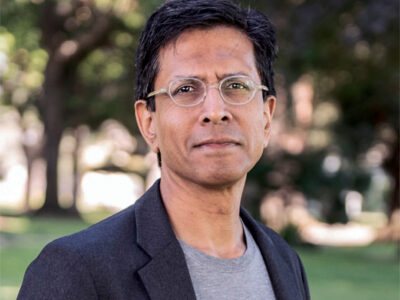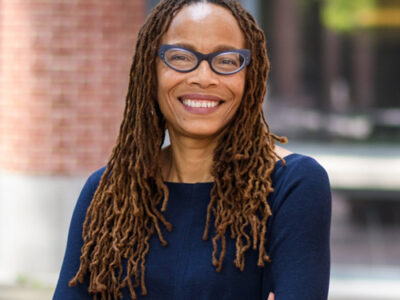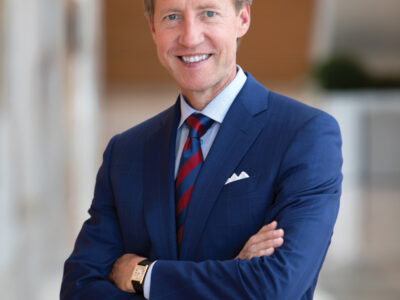Penn faculty and programs are taking the lead in integrating knowledge.
By Amy Gutmann
The Roman god Janus is an ancient deity with two faces, simultaneously looking forward and gazing back. The god of beginnings and of endings, the guardian of exits and of entrances, Janus embodied the importance of transition. At this time of year, during Commencement and at our class reunions, we also take the time to look toward the future and back at the past, celebrating the value of both legacy and change.
Our newest graduates are living in a truly transformative age, and Penn is committed to providing them with the breadth and depth of knowledge they need to be forward thinkers in a continuously changing society. The future they are facing requires comprehensive global knowledge. No longer will a single discipline, method, or perspective sufficiently serve to address the world’s most pressing needs. To be effective leaders, Penn graduates are learning to focus on solutions using much wider lenses.
Consider, for example, the thorny issue of providing affordable health care to all Americans. We all know that increasing coverage needs to be coupled with controlling costs. But how to do so most effectively and humanely is no simple matter: it requires an understanding of economics and medicine, politics and technology, culture and communications. It requires the acquisition of knowledge that combines the liberal arts with a firm grasp of emerging technology as well as an understanding of the pivotal role the professions play in our society. An educated citizenry must understand the serious responsibility that those who work in the professions have to humanity. They must have enough knowledge to hold professionals in both public and private sectors accountable, and to defend humankind against harmful and unethical behavior.
Since its founding, Penn has cultivated within its students a protean discernment of the world through interdisciplinary learning, and for generations our graduates have used that knowledge to better the world. Today, almost all universities embrace the notion of multidisciplinary scholarship. But Penn is taking the integration of knowledge one step further by building curricula that combine the teaching of liberal arts and sciences with a deeper study of the professions. That is why we continue to recruit world-class scholars with joint appointments between schools. It is also why we have introduced joint, dual-degree, and a host of hybrid majors that blend the broad scholarship of the liberal arts with professionally relevant education.
For example, Penn’s School of Arts and Sciences this year launched an Integrated Studies Program providing an innovative holistic curriculum that weaves the study of philosophy, mathematics, art, and literature with science, technology, and economics. As part of the program, three professors from the College—one from humanities, one from social sciences, and one from science—teach a course focusing on a single big theme from different rigorous perspectives. It will be second nature for students educated in Integrated Studies to consider the question of affordable healthcare, for example, by examining the biology, philosophy, anthropology, economic, and historical scope of the subject.
Through this global approach to scholarship, students develop manifold methods of thinking, based on synthesizing ideas from diverse fields of knowledge. They learn to cultivate creative ways to address life’s biggest questions, and they learn to propose new pathways forward with a unique appreciation for the many facets of knowledge that are now accessible to responsible decision makers.
Well-established multidisciplinary programs at Penn are popular among students who want to put their knowledge to work for humanity. The Philosophy, Politics and Economics program was created in 1994, with more and more students choosing it as a major each year. The PPE major provides a firm grounding in policy analysis, philosophy, economics, ethics, decision theory, and psychology. Armed with this powerful palette of knowledge, Penn students are well prepared to enter the fields of law, business, public administration, education, healthcare, and nonprofit work.
One PPE alum, Christopher Poliquin C’09, took what he learned at Penn to rural Honduras, to work as the assistant director of a non-governmental organization that promotes the teaching of environmental preservation, computer technology, and economic development to local youth. In a video Chris made about his experience, he says his concentration of study on the connection between psychology, ethics, and economics helped him provide his Honduran students with a more complete picture of the economic, political, and ethical questions related to the use of natural resources in their country. Chris is helping his students grow up to become leaders who will develop alternatives to an economic model dependent on environmentally damaging practices such as slash-and-burn farming.
An innovative new program at Penn that bridges the traditional divide between practical and theoretical knowledge is the Vagelos Integrated Program in Energy Research (VIPER), a dual-degree program between SAS and Penn Engineering established by a generous gift from emeritus trustee P. Roy Vagelos C’50 Hon’99 and his wife Diana [“Gazetteer,” Nov|Dec 2011]. The VIPER program addresses the need for cleaner, more sustainable energy sources by educating students in the science, economics, and ethics of harnessing, producing, and employing alternative fuels.
VIPER is one among many courses of study at Penn that prepare our students to constructively change the world in which they live, and to influence a world they cannot yet envision. These programs add to our already strong emphasis on integrating knowledge in research and teaching across all schools and departments. Our undergraduate dual-degree programs include the Huntsman Program in International Studies and Business, Nursing and Healthcare Management, the Vagelos Program in Life Sciences and Management, and the Jerome Fisher Program in Management and Technology. They all encourage students to pursue their intellectual interests while also cultivating a robust understanding of the societal role and responsibility of the professions. A comprehensive understanding of the interplay between theory and practice makes our graduates both globally competitive and primed for the ongoing satisfaction of lifelong learning.
At its best, a liberal arts and sciences education prepares undergraduates for success in whatever profession they choose to pursue, and it does so by virtue of teaching them to think creatively about themselves, their society, and the world. Despite what some may still believe, liberal arts and professional education are not mutually exclusive. In today’s knowledge-based economy they are both essentials: mutually supportive and singularly important in enabling university graduates to make the most positive impact in their lives and on the world.
Plato said that the good of education is that it enables individuals to “act nobly.” At Penn, we also make sure that a good education provides diverse perspectives, and we will continue to prepare students to “act nobly” as eminent professionals, thoughtful leaders, and responsible global citizens.




